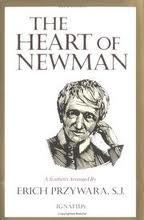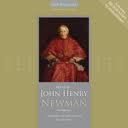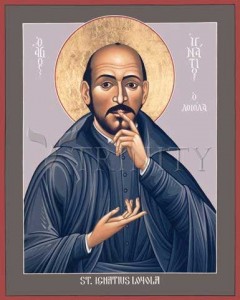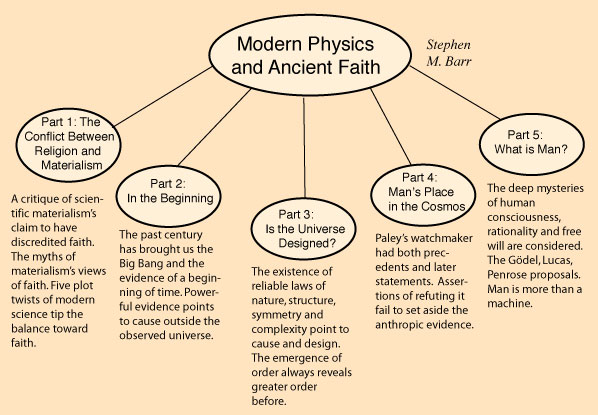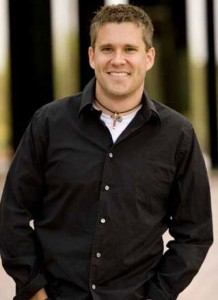We will be praying with and learning from Blessed John Henry Newman for many, many years to come.  Joseph Pearce has been a wonderful student, as well as instructor of (or should I say “illuminator of”) the life and work of  this great man, John Henry Newman, and who is now a bona fide memeber of the Cloud of Witnesses. It’s ALWAYS a joy to talk with Joseph, but it was really fantastic to speak with him in particular about Blessed John Henry Newman and the new books released by Ignatius Press to help us grow in our awareness of him!
Joseph Pearce has been a wonderful student, as well as instructor of (or should I say “illuminator of”) the life and work of  this great man, John Henry Newman, and who is now a bona fide memeber of the Cloud of Witnesses. It’s ALWAYS a joy to talk with Joseph, but it was really fantastic to speak with him in particular about Blessed John Henry Newman and the new books released by Ignatius Press to help us grow in our awareness of him!
[powerpress]
Tags: Blessed John Henry Newman, catholic, catholic podcast, catholic prayer, cathollc spirituality, ignatius press, john henry newman, joseph pearce, work
This entry was posted on Thursday, October 9th, 2014 at 10:49 am
You can follow any responses to this entry through the RSS 2.0 feed.
Episode 8 “What am I to do?†The Discernment of God’s Will in Everyday Decisions w/Fr. Timothy  Gallagher.
Gallagher.
In this episode, Fr. Gallagher discusses the Three Modes, and in particular the we discuss “The Second Mode”: Â The Attraction of the Heart. Â When clarity is received through the discernment of spirits of either spiritual consolation or desolation.
For other episodes in the series visit The Discerning Hearts “Discerning the Will of God†page
Father Timothy M. Gallagher, O.M.V., was ordained in 1979 as a member of the Oblates of the Virgin Mary, a religious community dedicated to retreats and spiritual formation according to the Spiritual Exercises of St. Ignatius. Â Fr. Gallagher is featured on the EWTN series “Living the Discerning Life: Â The Spiritual Teachings of St. Ignatius of Loyola”.
For more information on how to obtain copies of Fr. Gallaghers’s various books and audio which are available for purchase, please visit  his  website:   frtimothygallagher.org
For the other episodes in this series check out Fr. Timothy Gallagher’s “Discerning Hearts†page
Tags: catholic, catholic podcast, catholic prayer, cathollc spirituality
This entry was posted on Monday, October 6th, 2014 at 4:00 pm
You can follow any responses to this entry through the RSS 2.0 feed.
Episode 8 – Dr. Stephen Barr’s “Modern Physics & Ancient Faith” part 1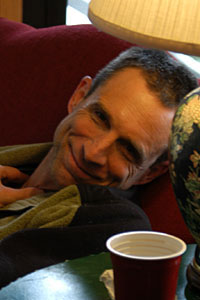
[powerpress]
In this episode Dr. Reno examines Faith and Reason through the work of Dr. Stephen Barr’s “Modern Physics and Ancient Faith” and enters into the concept of “Scientific Materialism”.
“Christian Apologetics with Dr. R. R. Reno” explores numerous facets of faith and reason in the life of the Church and the world. Grounded on the work of giants, such as St. Thomas Aquinas, St. Bonaventure, Blessed John Newman, soon-to-be Blessed John Paul II, G. K. Chesterton, Blaise Pascal and Stephen Barr, Dr. Reno helps us to open our minds to make the journey to our hearts.
R. R. Reno is the editor at First Things: A Journal of Religion, Culture, and Public Life, and Professor of Theology, currently on leave from Creighton University. His theological work has been published in many academic journals. Essays and opinion pieces on religion, public life, contemporary culture, and current events have appeared in Commentary, and the Washington Post. In Fighting the Noonday Devil Reno suggests that putting ourselves at the disposal of what is real is what trains us for true piety. His other recent books include Genesis: Brazos Theological Commentary on the Bible and Sanctified Vision: An Introduction to Early Christian Interpretation of the Bible.
Tags: catholic, catholic podcast, catholic prayer, cathollc spirituality
This entry was posted on Monday, October 6th, 2014 at 3:57 pm
You can follow any responses to this entry through the RSS 2.0 feed.
Confession to Priests
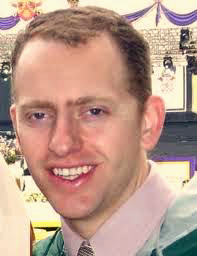
Faith Check/Greg Youell
[powerpress]
On this Faith Check let’s take a look at a common question: why confess your sins to a priest instead of straight to God?
First, Catholics are encouraged to privately confess our sins to God all the time and every single Mass begins with a penitential rite in which we do exactly this.
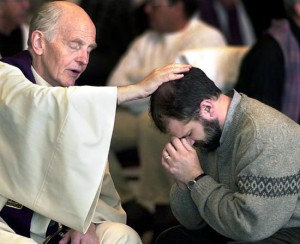 Still we should regularly go to the sacrament of confession or reconciliation. Remember that in the Old Testament a Hebrew was to publicly go to the temple and offer a sacrifice for his sin. In John 20, our Lord gives the apostles authority to forgive sins in his name, when He breathed the Holy Spirit on them and said “whose sins you forgive are forgiven them, and whose sins you retain are retained.†1 In 2 Corinthians Paul also notes that the apostles are Christ’s ambassadors who have been given the ministry of reconciliation.2
Still we should regularly go to the sacrament of confession or reconciliation. Remember that in the Old Testament a Hebrew was to publicly go to the temple and offer a sacrifice for his sin. In John 20, our Lord gives the apostles authority to forgive sins in his name, when He breathed the Holy Spirit on them and said “whose sins you forgive are forgiven them, and whose sins you retain are retained.†1 In 2 Corinthians Paul also notes that the apostles are Christ’s ambassadors who have been given the ministry of reconciliation.2
Early Christian records show that the early Church always understood this according to the Catholic view3:those who sinned gravely after baptism could be reconciled to the Church through confession to the priests, who do not stand as barriers to Christ, but as his ambassadors, who lovingly take us by the hand and restore us to grace after we have fallen.
1 -Â Jn. 20:23
2 -Â 5:18-20
3 – See Catholic Answers website on subject: http://www.catholic.com/library/Confession.asp
Tags: catholic, catholic apologetics, catholic podcast, catholic prayer, cathollc spirituality, confession, penance, reconciliation
This entry was posted on Monday, October 6th, 2014 at 12:01 am
You can follow any responses to this entry through the RSS 2.0 feed.
Episode 29- The Holy Rule of St. Benedict: A Spiritual Path for Today’s World with Fr. Mauritius Wilde O.S.B., 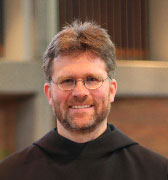 PhD.
PhD.
“The Life of St. Benedict pt 2”
We begin the reflection of the life of St. Benedict by using the biography penned by St. Gregory the Great. This episode continues the teaching on detachment, particularly from our earthly mothers.
[powerpress]
From the Life of Our Most Holy Father St. Benedict by St. Gregory the Great:
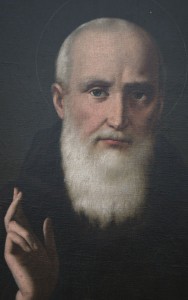
 CHAPTER I.
Benedict having now left the schools resolved to betake himself to the desert, accompanied only by his nurse who most tenderly loved him. Coming therefore to a place called Affile, and remaining for some time in the Church of St. Peter by the charitable invitement of many virtuous people who lived there for devotion, so it chanced that his nurse borrowed of a neighbour a sieve to cleanse wheat, which being left carelessly upon the table was found broken in two pieces. Therefore on her return finding it broke, she began to weep bitterly because it was only lent her. But the religious and pious boy, Benedict, seeing his nurse lament was moved with compassion, and taking with him the two pieces of the broken sieve, with tears he gave himself to prayer, which no sooner ended, but he found the sieve whole, and found not any sign that it had been broken. Then presently he restored the sieve which had been broken, whole to his nurse, to her exceeding comfort. This matter was divulged unto all that lived thereabout, and so much admired by all, that the inhabitants of that place caused the sieve to be hanged up in the Church porch, that not only those present, but all posterity might know with how great gifts of grace Benedict had been endowed from the beginning of his conversion. The sieve remained to be seen for many years after, and hung over the Church door even until the times of the Longobards.
But Benedict more desirous to suffer afflictions than covetous of praise; and rather willing to undergo labours for the honour of God, than to be extolled with the favours of this world, fled secretly from his nurse to a remote place in the desert called Subiaco, distant about forty miles from Rome, in which a fountain springing with cool and crystal waters, extendeth itself at first into a broad lake, and running farther with increase of waters becometh at the last a river.
 For more information about the ministry of the the Missionary Benedictines of Christ the King Priory in Schuyler, Nebraska visit here:
For more information about the ministry of the the Missionary Benedictines of Christ the King Priory in Schuyler, Nebraska visit here:
Tags: catholic, catholic podcast, catholic prayer, cathollc spirituality
This entry was posted on Saturday, October 4th, 2014 at 3:36 pm
You can follow any responses to this entry through the RSS 2.0 feed.
CW6 – St. Francis –  The “Never-Enough” – The Great Cloud of Witnesses: Guides 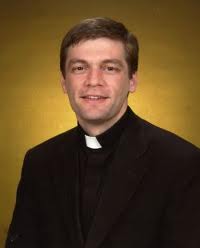 for Prayer with Fr. Mark Cyza
for Prayer with Fr. Mark Cyza
[powerpress]
Fr. Mark Cyza discusses the witness of St. Francis and how he was transformed through his encounter with Christ.
Fr. Cyza reflects on the passage from the novel by Nikos Kazantzakis,  when Brother Leo, the faithful companion of St. Francis,  heard him cry : “Love is not loved, Love is not lovedâ€.  Leo asked: “Why are you crying, Brother Francis?†Francis did not reply, he simply continued to say, “Love is not loved, Love is not loved…â€
Leo said to him: “But Francis, do you not think that you have done enough for Jesus by leaving you father and mother, your friends and a future of glory? And Francis answered: “No, it is not enoughâ€.
“But Francis, – Leo continued to say -, does it not seem to you to be enough to have removed your clothes before everybody, to beg alms along the streets of the town, to embrace a leper… so that you are looked upon as a fool by your own?†“No, it is not enoughâ€, responded Francis again.
For the third time Leo insisted: “Francis, does it not seem to be enough to suffer as you are suffering because of the stigmata, the rebellion of the Ministers, the illness of your eyes?†And once again Francis, this time in a loud voice, shouted: “No, it is not enough, it is not enough, it is not enoughâ€. And he concluded saying: “Write it and remember it in you heart, Brother Leo, God is the never-enoughâ€.
Tags: catholic, catholic podcast, catholic prayer, cathollc spirituality
This entry was posted on Saturday, October 4th, 2014 at 3:23 pm
You can follow any responses to this entry through the RSS 2.0 feed.
The Sunday, Sunday, Sunday Podcast is a reflection on the upcoming Sunday Mass readings presented by LifeTeen.com and hosted by Mark Hart.
Sunday Readings from the USCCB
Reading 1 Â EZ 18:25-Â 28
Responsorial Psalm PS 80:9, 12, 13-14, 15-16, 19-20
Reading 2 Â PHIL 4:6-9
Gospel MT 21:33-43
Jesus said to the chief priests and the elders of the people:
“Hear another parable.
There was a landowner who planted a vineyard,
put a hedge around it, dug a wine press in it, and built a tower.
Then he leased it to tenants and went on a journey.
When vintage time drew near,
he sent his servants to the tenants to obtain his produce.
But the tenants seized the servants and one they beat,
another they killed, and a third they stoned.
Again he sent other servants, more numerous than the first ones,
but they treated them in the same way.
Finally, he sent his son to them, thinking,
‘They will respect my son.’
But when the tenants saw the son, they said to one another,
‘This is the heir.
Come, let us kill him and acquire his inheritance.’
They seized him, threw him out of the vineyard, and killed him.
What will the owner of the vineyard do to those tenants when he comes?”
They answered him,
“He will put those wretched men to a wretched death
and lease his vineyard to other tenants
who will give him the produce at the proper times.”
Jesus said to them, “Did you never read in the Scriptures:
The stone that the builders rejected
has become the cornerstone;
by the Lord has this been done,
and it is wonderful in our eyes?
Therefore, I say to you,
the kingdom of God will be taken away from you
and given to a people that will produce its fruit.”
Lectionary for Mass for Use in the Dioceses of the United States, second typical edition, Copyright © 2001, 1998, 1997, 1986, 1970 Confraternity of Christian Doctrine;
Tags: catholic, catholic podcast, catholic prayer, cathollc spirituality
This entry was posted on Saturday, October 4th, 2014 at 2:20 pm
You can follow any responses to this entry through the RSS 2.0 feed.
Episode 2 – Great Works in Western Literature with Joseph Pearce – Emily Bronte [powerpress]
[powerpress]
Wuthering Heights is one of the classic novels of nineteenth century romanticism. As a major work of modern literature it retains its controversial status. What was Emily Brontë’s intention? Were her  intentions iconoclastic? Were they feminist? Were they Christian or post-Christian? Who are the heroes and the villains in this dark masterpiece? Are there any heroes? Are there any villains?
intentions iconoclastic? Were they feminist? Were they Christian or post-Christian? Who are the heroes and the villains in this dark masterpiece? Are there any heroes? Are there any villains?
 Based on the Ignatius Critical Edition, this series examines, from the Judeo-Christian perspective, the life,the times, and influence of authors of great works in literature .
Based on the Ignatius Critical Edition, this series examines, from the Judeo-Christian perspective, the life,the times, and influence of authors of great works in literature .
Joseph Pearce is currently the Writer-in-Residence and Visiting Fellow at Thomas More College of Liberal Arts in Merrimack, New Hampshire. He is also Visiting Scholar at Mount Royal Academy in Sunapee, New Hampshire. He is also Visiting Scholar at Mount Royal Academy in Sunapee, New Hampshire. He is  co-editor of the Saint Austin Review (or StAR), an international review of Christian culture, literature, and ideas published in England (Family Publications) and the United States (Sapientia Press). He is also the author of many books, including literary biographies of Solzhenitsyn, J. R. R. Tolkien, C. S. Lewis, G. K. Chesterton, and Oscar Wilde.
To learn more about the authors and titles available in the Ignatius Critical Editions
Tags: ave maria university, catholic, catholic podcast, catholic prayer, cathollc spirituality, emily bronte, ignatius press, ignatius press critical editions, joseph pearce, literature, oscar wilde, work, works, wuthering heights
This entry was posted on Wednesday, October 1st, 2014 at 11:36 am
You can follow any responses to this entry through the RSS 2.0 feed.
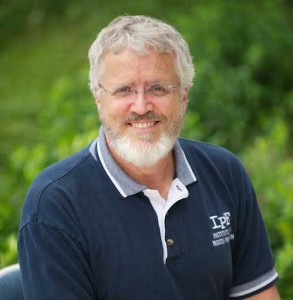 Episode 5 Salvation Begins Now: Last Things First – Â Deacon Keating discusses Hell.
Episode 5 Salvation Begins Now: Last Things First – Â Deacon Keating discusses Hell.
[powerpress]
From the Catechism of the Catholic Church:
1057   Hell’s principal punishment consists of eternal separation from God in whom alone man can have the life and happiness for which he was created and for which he longs.
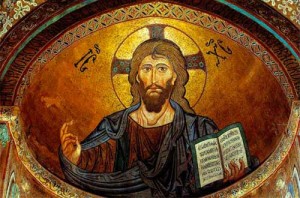
Deacon James Keating, PhD, the director of Theological Formation for the Institute for Priestly Formation, located at Creighton University, in Omaha.
For more information on the “Institute of Priestly Formation” and for other material available by Deacon Keating, just click here
Don’t forget to pickup a copy of “Communion with Christ” , it is one of the best audio sets on prayer…ever!
Check out Deacon Keating’s “Discerning Heart” page
Tags: catholic, catholic podcast, catholic prayer, cathollc spirituality, creighton university, hell, institute for priestly formation
This entry was posted on Tuesday, September 30th, 2014 at 1:52 pm
You can follow any responses to this entry through the RSS 2.0 feed.
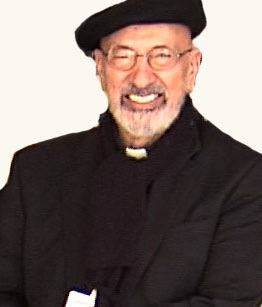 BKL 76 ” Building a Kingdom of Love” – The Need for Spiritual Direction
BKL 76 ” Building a Kingdom of Love” – The Need for Spiritual Direction
[powerpress]  Msgr. Esseff reflects on why we need spiritual direction on the spiritual journey.
Gospel MT 21:28-32
“What is your opinion?
A man had two sons.
He came to the first and said,
‘Son, go out and work in the vineyard today.’
He said in reply, ‘I will not,’
but afterwards changed his mind and went.
The man came to the other son and gave the same order.
He said in reply, ‘Yes, sir, ‘but did not go.
Which of the two did his father’s will?”
They answered, “The first.”
Jesus said to them, “Amen, I say to you,
tax collectors and prostitutes
are entering the kingdom of God before you.
When John came to you in the way of righteousness,
you did not believe him;
but tax collectors and prostitutes did.
Yet even when you saw that,
you did not later change your minds and believe him.”
Msgr. John A. Esseff is a Roman Catholic priest in the Diocese of Scranton. He was ordained on May 30th 1953, by the late Bishop William J. Hafey, D.D. at St. Peter’s Cathedral in Scranton, PA. Msgr. Esseff served a retreat director and confessor to Blessed Mother Teresa. He continues to offer direction and retreats for the sisters of the missionaries of charity around the world. Msgr. Esseff encountered St. Padre Pio, who would become a spiritual father to him. He has lived in areas around the world, serving in the Pontifical missions, a Catholic organization established by Bl. Pope John Paul II to bring the Good News to the world especially to the poor. Msgr. Esseff assisted the founders of the Institute for Priestly Formation and continues to serve as a spiritual director for the Institute. He continues to serve as a retreat leader and director to bishops, priests and sisters and seminarians and other religious leaders around the world.   To obtain a copy of Msgr. Esseff’s book by visiting here  Be sure to visit Msgr. Esseff’s website “Building a Kingdom of Love“
 To obtain a copy of Msgr. Esseff’s book by visiting here  Be sure to visit Msgr. Esseff’s website “Building a Kingdom of Love“
Tags: catholic, catholic podcast, catholic prayer, cathollc spirituality
This entry was posted on Tuesday, September 30th, 2014 at 12:55 pm
You can follow any responses to this entry through the RSS 2.0 feed.
Learn more about St. Jerome in our fascinating discussion with Mike Aquilina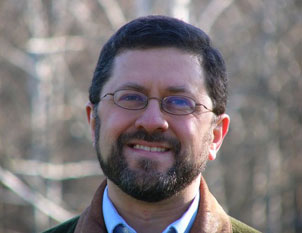
[powerpress]
Spiritual Writings:
 - Letters
-Â The Perpetual Virginity of Blessed Mary
-Â To Pammachius Against John of Jerusalem
-Â The Dialogue Against the Luciferians
-Â The Life of Malchus, the Captive Monk
-Â The Life of S. Hilarion
-Â The Life of Paulus the First Hermit
-Â Against Jovinianus
-Â Against Vigilantius
-Â Against the Pelagians
-Â Prefaces
-Â De Viris Illustribus (Illustrious Men)
-Â Apology for himself against the Books of Rufinus
Prayer to St. Jerome
 For Insight
Through your anger and confrontations you remind us that we all have a duty to confront others from time to time. You also remind us that we have a duty to examine ourselves and confront our own weaknesses and harmful behaviours. Your life teaches that I must accept others for who they are. You taught of the danger of self-righteousness; of the importance of reflecting upon one of Jesus’ most insightful teachings: “Let the man who has no sin on his conscience throw the first stone.” In the light of your teachings, Saint Jerome, help me to see my own self clearly. Help me to confront my own biases and to act to change others only out of love. If I see that I have the duty to confront another, I ask you to be with me during those necessary but unpleasant moments of confrontation. Help me to remember that love alone can make changes for the good.
Amen.
The Thunderer
God’s angry man, His crotchety scholar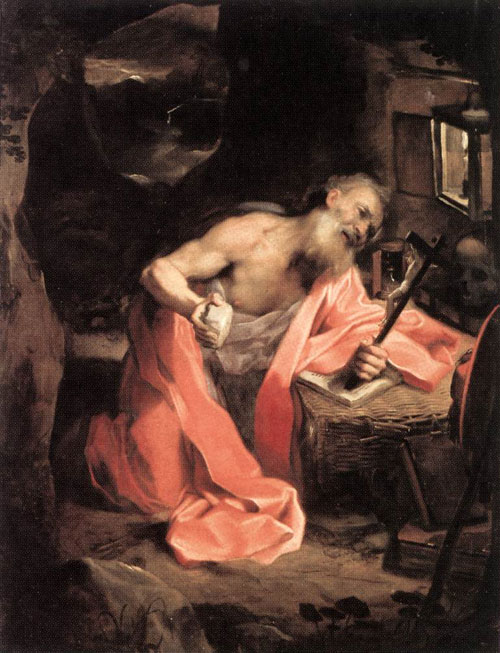
Was Saint Jerome,Â
The great name-caller
Who cared not a dime
For the laws of Libel
And in his spare time
Translated the Bible.
Quick to disparage
All joys but learning
Jerome thought marriage
Better than burning;
But didn’t like woman’s
Painted cheeks;
Didn’t like Romans,
Didn’t like Greeks,
Hated Pagans
For their Pagan ways,
Yet doted on Cicero all of his days.
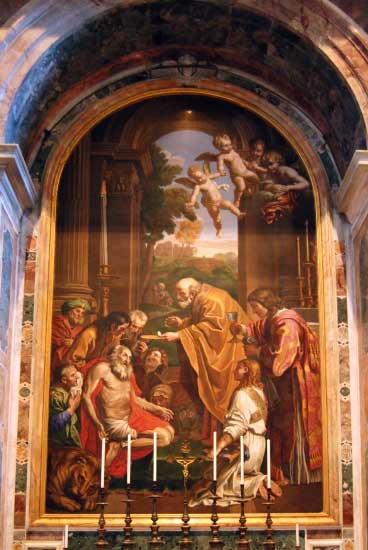
A born reformer, cross and gifted,
He scolded mankind
Sterner than Swift did;
Worked to save
The world from the heathen;
Fled to a cave
For peace to breathe in,
Promptly wherewith
For miles around
He filled the air with
Fury and sound.
In a mighty prose
For Almighty ends,
He thrust at his foes,
Quarreled with his friends,
And served his Master,
Though with complaint.
He wasn’t a plaster sort of a saint.
But he swelled men’s minds
With a Christian leaven.
It takes all kinds
To make a heaven
by Phyllis McGinley, from “Times Three: Selected Verse from Three Decades with Seventy New Poems”, (Pulitzer Prize Winner).
Tags: catholic, catholic podcast, catholic prayer, cathollc spirituality, father, fathers mike, love, mike aquilina, phyllis mcginley, saint jerome, St Jerome
This entry was posted on Tuesday, September 30th, 2014 at 12:13 pm
You can follow any responses to this entry through the RSS 2.0 feed.
Episode 7- St. John Paul II – Fides et Ratio : Faith and Reason
[powerpress]
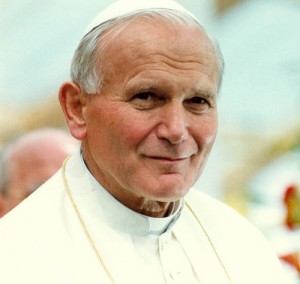 In this episode Dr. Reno examines Faith and Reason through St. John Paul II’s “Fides et Ratio”.
In this episode Dr. Reno examines Faith and Reason through St. John Paul II’s “Fides et Ratio”.
|
For an online version of “Fides et Ratio’ click here
“Christian Apologetics with Dr. R. R. Reno” explores numerous facets of faith and reason in the life of the Church and the world. Grounded on the work of giants, such as St. Thomas Aquinas, St. Bonaventure, Blessed John Newman, soon-to-be Blessed John Paul II, G. K. Chesterton, Blaise Pascal and Stephen Barr, Dr. Reno helps us to open our minds to make the journey to our hearts.
R. R. Reno is the editor at First Things: A Journal of Religion, Culture, and Public Life, and Professor of Theology, currently on leave from Creighton University. His theological work has been published in many academic journals. Essays and opinion pieces on religion, public life, contemporary culture, and current events have appeared in Commentary, and the Washington Post. In Fighting the Noonday Devil Reno suggests that putting ourselves at the disposal of what is real is what trains us for true piety. His other recent books include Genesis: Brazos Theological Commentary on the Bible and Sanctified Vision: An Introduction to Early Christian Interpretation of the Bible.
Tags: catholic, catholic podcast, catholic prayer, cathollc spirituality
This entry was posted on Monday, September 29th, 2014 at 4:43 pm
You can follow any responses to this entry through the RSS 2.0 feed.
Episode 7 “What am I to do?†The Discernment of God’s Will in Everyday Decisions w/Fr. Timothy Gallagher
In this episode, Fr. Gallagher discusses the Three Modes, and in particular the we discuss “The First Mode”:  When there is a clarity without doubting. Sometimes the right decision is unmistakably clear. We know what the right choice is. This knowledge is a gift from God. All we need do is act on what we know to be the right direction. Often this takes some time. We put off acting on what we know we should do.
For other episodes in the series visit The Discerning Hearts “Discerning the Will of God†page
Father Timothy M. Gallagher, O.M.V., was ordained in 1979 as a member of the Oblates of the Virgin Mary, a religious community dedicated to retreats and spiritual formation according to the Spiritual Exercises of St. Ignatius. Â Fr. Gallagher is featured on the EWTN series “Living the Discerning Life: Â The Spiritual Teachings of St. Ignatius of Loyola”.
For more information on how to obtain copies of Fr. Gallaghers’s various books and audio which are available for purchase, please visit  his  website:   frtimothygallagher.org
For the other episodes in this series check out Fr. Timothy Gallagher’s “Discerning Hearts†page
Tags: catholic, catholic podcast, catholic prayer, cathollc spirituality
This entry was posted on Monday, September 29th, 2014 at 4:37 pm
You can follow any responses to this entry through the RSS 2.0 feed.
The Sunday, Sunday, Sunday Podcast is a reflection on the upcoming Sunday Mass readings presented by LifeTeen.com and hosted by Mark Hart.
Sunday Readings from the USCCB
Reading 1Â EZ 18:25-28
Responsorial Psalm PS 25:4-5, 8-9, 10, 14
Reading 2 Â PHIL 2:1-11
Gospel  MT 21:28-32
“What is your opinion?
A man had two sons.
He came to the first and said,
‘Son, go out and work in the vineyard today.’
He said in reply, ‘I will not, ‘
but afterwards changed his mind and went.
The man came to the other son and gave the same order.
He said in reply, ‘Yes, sir, ‘but did not go.
Which of the two did his father’s will?”
They answered, “The first.”
Jesus said to them, “Amen, I say to you,
tax collectors and prostitutes
are entering the kingdom of God before you.
When John came to you in the way of righteousness,
you did not believe him;
but tax collectors and prostitutes did.
Yet even when you saw that,
you did not later change your minds and believe him.”
Lectionary for Mass for Use in the Dioceses of the United States, second typical edition, Copyright © 2001, 1998, 1997, 1986, 1970 Confraternity of Christian Doctrine;
Tags: catholic, catholic podcast, catholic prayer, cathollc spirituality
This entry was posted on Saturday, September 27th, 2014 at 8:06 pm
You can follow any responses to this entry through the RSS 2.0 feed.
USCCA44 Â Chapter 35-Â God Calls Us To Pray – The Foundations of Prayer pt 1
[powerpress]
Archbishop Lucas offers insights on the US Catholic Catechism for Adults Chapter 35:
Descriptions of prayer are abundant throughout Christian history. “True prayer,†wrote St. Augustine, “is nothing but love.†Prayer should arise from the heart. “Prayer,†said St. John Vianney, “is the inner bath of love into which the soul plunges itself.†“Everyone of us needs half an hour of prayer each day,†remarked St. Francis de Sales, “except when we are busy—then we need an hour.†Definitions of prayer are important, but insufficient. There is a huge difference between knowing about prayer and praying. On this issue, the Rule of St. Benedict is clear: “If a man wants to pray, let him go and pray.â€
St. John Damascene gave a classic definition of prayer: “Prayer is the raising of one’s mind and heart to God or the requesting of good things from God†(CCC, no. 2559, citing St. John Damascene, De Fide Orth. 3, 24).
The Catechism clearly defines prayer as a “vital and personal relationship with the living and true God†(CCC, no. 2558). Prayer is Christian “insofar as it is communion with Christ†(CCC, no. 2565), and a “covenant relationship between God and man in Christ†(CCC, no. 2564).
United States Conference of Catholic Bishops (USCCB) (2012-04-02). United States Catholic Catechism for Adults (Kindle Locations 6658-6667). United States Conference of Catholic Bishops (USCCB). Kindle Edition.
The Most Reverend George J. Lucas leads the Archdiocese of Omaha.Â
For other episodes in the visit our Archbishop George Lucas page
This programs is based on:
More information can be found here.
We wish to thank the USCCB for the permissions granted for use of  relevant material used in this series.
Tags: catholic, catholic podcast, catholic prayer, cathollc spirituality
This entry was posted on Thursday, September 25th, 2014 at 2:44 pm
You can follow any responses to this entry through the RSS 2.0 feed.

